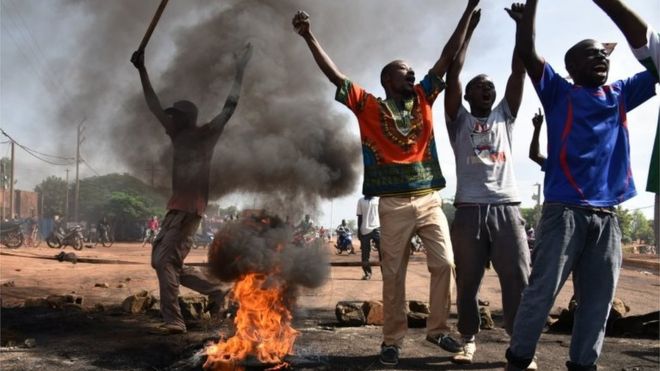
Burkina Faso's Presidential Security
Regiment (RSP) has ousted the interim government of President Michel
Kafando and replaced it with a junta known as the National Council for
Democracy (CND).
The junta accused the government of "mismanaging"
the transition, which was scheduled to end with general elections on 11
October this year. The transitional government was formed after former
President Blaise Compaore was ousted following protests in October 2014.The RSP, which was prominent under Mr Compaore, has had a rocky relationship with the interim authorities. On 14 September, a government commission recommended the disbandment of the RSP.
Below are brief profiles of the key personalities and groups involved in the crisis.
Brigadier-General Gilbert Diendere
Brig-Gen Diendere is the officer who announced the 15 October 1987 coup that brought Mr Compaore to power. He was instrumental in the formation of the RSP in 1995 and acted as its de facto head until Mr Compaore was ousted.
Gen Diendere's wife, Fatoumata Diallo Diendere, was an MP in the forming ruling party, CDP, and therefore currently banned from contesting the forthcoming elections.
Earlier in 2015, there was speculation that he would be appointed head of Burkina Faso's anti-terrorism operations. In February, he attended the US-led counter-terrorism exercises in Chad.
Moumina Cherif Sy
A journalist by profession, Mr Sy was also considered for the interim presidency after Mr Compaore was forced to resign.
In 1990, Mr Sy founded the Bendre newspaper, which carried hard-hitting editorials and glorified the ideals of the 1983 coup that brought the late charismatic military ruler, Thomas Sankara, to power. Sankara was killed during the October 1987 coup led by Mr Compaore.
Lt-Col Joseph Moussa Celeste Coulibaly
He is the head of the RSP. He has been in France since August attending the French military academy in Saint Cyr. He is another former aide to Mr Compaore.Lt-Col Coulibaly accompanied Mr Compaore into exile before returning home to rejoin the RSP. He took over as head of the RSP in February 2015.
Michel Kafando
He served as the country's envoy to the UN between 1981 and 1982, and then foreign minister until 1983. He later served as the UN envoy from 1998 to 2011, when he retired.
The 73-year-old leader was initially detained in the presidential palace, but the junta later released him as part of peace negotiations.
Lt-Col Yacouba Isaac Zida
Immediately afterwards, Lt-Col Zida took over as head of state before being pressed to hand over power to Mr Kafando in November 2014. He was subsequently appointed interim prime minister.
Since then he has had rocky relations with members of the RSP, who view him as a traitor.
In December 2014, elements of the RSP disrupted a cabinet meeting and demanded guarantees on the non-dissolution of the unit, payment of bonuses and the sacking of Theophile Nikiema, who had been named a military adviser at the presidency. Mr Nikiema is an ally of Lt-Col Zida. The soldiers were unhappy that Mr Nikiema had been picked over other senior RSP officers. A similar protest took place in February.
Congress for Democracy and Progress (CDP)
This is Mr Compaore's former ruling party. It was formed in February 1996 and ruled the country until Compaore resigned.The party is a pale shadow of its former self. It suffered a major setback on 25 August, when the Constitutional Court excluded some of its candidates, including its current leader and presidential flag bearer, Eddie Komboigo, from the polls citing a controversial electoral law.
By the time the ruling was made, the deadline for the submission of the presidential candidatures had passed on 21 August. More than 40 CDP legislative candidates were also disqualified. The judgement effectively locked the party out of the presidential race.
The law, passed by the interim parliament in April, disqualified politicians who supported Mr Compaore's bid to extend his 27-year rule.
Balai Citoyen
The group was formed in 2013 by two musicians - Karim Sama and Serge Bambara (popularly known by their stage names Sams'K Le Jah and Smockey respectively).
Balai Citoyen actively mobilised civilians to reject Mr Compaore's bid to extend his rule.
The group has called for "popular resistance" in every neighbourhood against the "RSP militia".
Since the 2014 uprising, Balai Citoyen has been vocal in demanding the dismantling of the RSP and other vestiges of the Compaore era.
The movement has sought to propagate the ideals of Thomas Sankara.
This story was sourced from http://www.bbc.com/news/world-africa-34318822
No comments:
Post a Comment